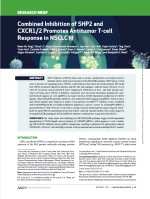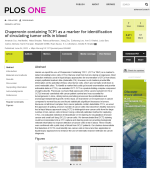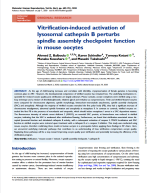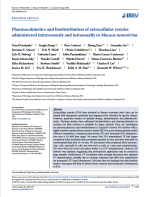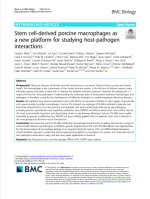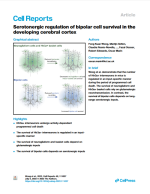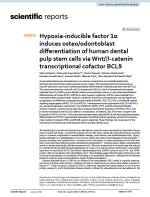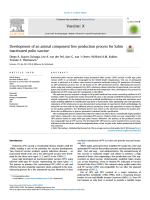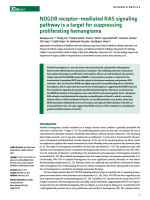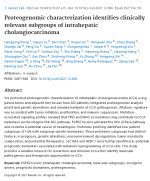06.01.2023
Combined Inhibition of SHP2 and CXCR1/2 Promotes Antitumor T-cell Resp...
Abstract SHP2 inhibitors (SHP2i) alone and in various combinations are being tested in multiple tumors with overactivation of the RAS/ERK pathway. SHP2 plays critical roles in normal cell signaling; hence, SHP2is could influence the tumor microenvironment. We found that SHP2i treatment depleted alveolar and M2-like macrophages, induced tumor-intrinsic CCL5/CXCL10 secretion, and promoted B and T lymphocyte infiltration in Kras- and Egfr-mutant non–small cell lung cancer (NSCLC). However, treatment also increased intr...
09.12.2022
Chaperonin containing TCP1 as a marker for identification of circulati... PLOS ONE, 2022
Abstract Herein we report the use of Chaperonin-Containing TCP-1 (CCT or TRiC) as a marker to detect circulating tumor cells (CTCs) that are shed from tumors during oncogenesis. Most detection methods used in liquid biopsy approaches for enumeration of CTCs from blood, employ epithelial markers like cytokeratin (CK). However, such markers provide little information on the potential of these shed tumor cells, which are normally short-lived, to seed metastatic sites. To identify a marker that could go beyond enumeration and pr...
02.12.2022
Vitrification-induced activation of lysosomal cathepsin B perturbs spi... Molecular Human Reproduction, 2020
Abstract As the age of child-bearing increases and correlates with infertility, cryopreservation of female gametes is becoming common-place in ART. However, the developmental competence of vitrified oocytes has remained low. The underlying mechanisms responsible for reduced oocyte quality post-vitrification are largely unknown. Mouse cumulus–oocyte complexes were vitrified using a cryoloop technique and a mixture of dimethylsulphoxide, ethylene glycol and trehalose as cryoprotectants. Fresh and vitrified/thawed oocytes were compared fo...
25.11.2022
Pharmacokinetics and biodistribution of extracellular vesicles adminis... Journal of Eytracellular Biology, 2022
Abstratct Extracellular vesicles (EVs) have potential in disease treatment since they can be loaded with therapeutic molecules and engineered for retention by specific tissues. However, questions remain on optimal dosing, administration and pharmacokinetics. Previous studies have addressed biodistribution and pharmacokinetics in rodents, but little evidence is available for larger animals. Here, we investigated the pharmacokinetics and biodistribution of Expi293F-derived EVs labelled with a highly sensitive nanoluciferase reporter (palmGRE...
04.11.2022
Stem cell-derived porcine macrophages as a new platform for studying h... BMC Biology, 2022
Abstract Background Infectious diseases of farmed and wild animals pose a recurrent threat to food security and human health. The macrophage, a key component of the innate immune system, is the first line of defence against many infectious agents and plays a major role in shaping the adaptive immune response. However, this phagocyte is a target and host for many pathogens. Understanding the molecular basis of interactions between macrophages and pathogens is therefore crucial for the development of effective strategies to comba...
28.10.2022
Serotonergic regulation of bipolar cell survival in the developing cer... Cell Reports, 2022
Abstract One key factor underlying the functional balance of cortical networks is the ratio of excitatory and inhibitory neurons. The mechanisms controlling the ultimate number of interneurons are beginning to be elucidated, but to what extent similar principles govern the survival of the large diversity of cortical inhibitory cells remains to be investigated. Here, we investigate the mechanisms regulating developmental cell death in neurogliaform cells, bipolar cells, and basket cells, the three main population...
21.10.2022
Hypoxia-inducible factor 1α induces osteo/odontoblast differentiation... Scientific Reports, 2022
Abstract Accelerated dental pulp mineralization is a common complication in avulsed/luxated teeth, although the mechanisms underlying this remain unclear. We hypothesized that hypoxia due to vascular severance may induce osteo/odontoblast differentiation of dental pulp stem cells (DPSCs). This study examined the role of B-cell CLL/lymphoma 9 (BCL9), which is downstream of hypoxia-inducible factor 1α (HIF1α) and a Wnt/β-catenin transcriptional cofactor, in the osteo/odontoblastic differentiation of human DPSCs (hDPSCs) unde...
07.10.2022
Development of an animal component free production process for Sabin i... Vaccine X, 2022
Abstract Inactivated polio vaccine production using attenuated Sabin strains (sIPV) instead of wild type polio viruses (cIPV) is an initiative encouraged by the World Health Organization. This use of attenuated viruses is preferred as it reduces risks related to...
30.09.2022
NOGOB receptor-mediated RAS signaling pathway is a target for suppress... JCI Insight, 2021
Abstract Infantile hemangioma is a vascular tumor characterized by the rapid growth of disorganized blood vessels followed by slow spontaneous involution. The underlying molecular mechanisms that regulate hemangioma proliferation and involution still are not well elucidated. Our previous studies reported that NOGOB receptor (NGBR), a transmembrane protein, is required for the translocation of prenylated RAS from the cytosol to the plasma membrane and promotes RAS activation. Here, we show that NGBR was highly expressed in the proliferating...
23.09.2022
Proteogenomic characterization identifies clinically relevant subgroup... Cancer Cell, 2022
Abstract We performed proteogenomic characterization of intrahepatic cholangiocarcinoma (iCCA) using paired tumor and adjacent liver tissues from 262 patients. Integrated proteogenomic analyses prioritized genetic aberrations and revealed hallmarks of iCCA pathogenesis. Aflatoxin signature was associated with tumor initiation, proliferation, and immune suppression. Mutation-associated signaling profiles revealed that TP53 and KRAS co-mutations may contribute to iCCA metastasis via the integrin-FAK-SRC pathway. FGFR2 fusions activated the R...



